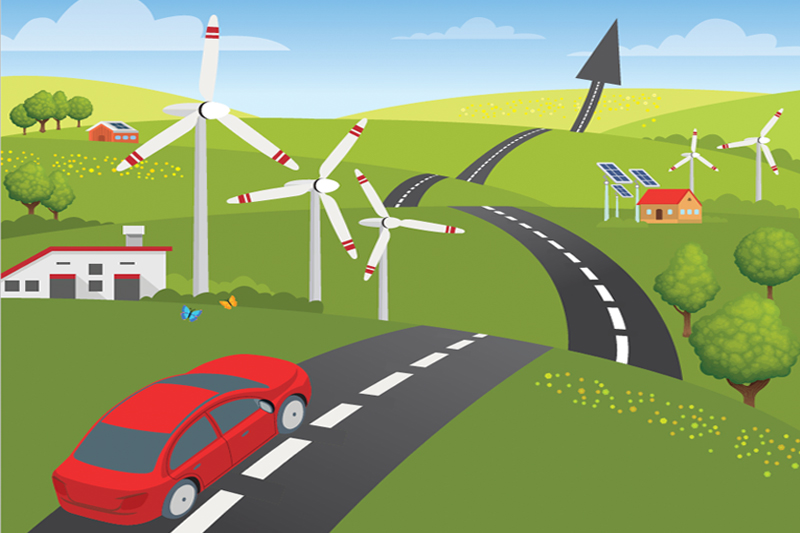
We hear from Charley Grimston, Co-founder of Altelium and CEO of CNC Asset, who explains why the electric car market will be energised following the coronavirus pandemic.
We’re all searching for good news stories at the moment. Many car manufacturers are switching their production to making ventilators, which is wonderful news. But the basic economic overview for the automotive market is grim.
However, there are three powerful reasons why the electric vehicle market will be supercharged by this dreadful virus, and when lockdown is over.
Firstly, people will want to drive electric vehicles because diesel and petrol forecourts will be perceived as unclean. You have to hold the pump the previous person has used, touch the screen or enter the shop to pay. With electricity you can fuel up in your own home. We may all want to get back to normal but some things can’t be unknown, and one of those things is how infection is transmitted.
Secondly, people will want to do things differently and better. Consumers who can afford to buy cars will want to play a part in making the world a better, greener place. We have been watching how nature has responded to humans in lockdown: “This is the first time I have seen such a dramatic drop-off over such a wide area for a specific event,” said Fei Liu, an Air Quality Researcher at NASA’s Goddard Space Flight Centre, describing levels of nitrogen dioxide over China.
Pollution levels have fallen by 50% in New York because of measures taken to contain the coronavirus. Transport contributes 23% of global carbon emissions, and driving is by far the largest element of that, contributing 72% of transport carbon emissions.
When the engines of the economy start again, we’ll want to try and preserve these gains. A report just published by the ‘Journal of Nature’ has proved that electric vehicles produce less carbon dioxide than petrol cars across the vast majority of the globe. There were lingering doubts in some quarters about the environmental credentials of electric cars, centred around the battery. This report lays those concerns to rest. So, when people start buying again, they will buy with the environment in mind – and that means electric.
And thirdly, people who are buying will want to buy well. This global lockdown and coronavirus is like nothing we have ever experienced, but what many of us have experienced is recession. At times of recession, or worse, warranties become far more important to both the consumer and the manufacturer.
To the consumer, a long warranty is a sign of quality and reassurance. To the manufacturer it provides a way to demonstrate your belief in your product quality. A warranty allows a product to be sold on quality and therefore protects profit margins. Profitably is also protected further downstream, where a warranty allows the manufacturer to offer range of customer service and support, underwritten by their insurance.
How do we know this is the case? At Altelium we have been providing damage and breakdown extended warranty and renewable energy insurance for plant and machinery for over 20 years. We have seen ourselves and our customers through huge fluctuations in the market, and what has provided consistent protection throughout this time is the warranty.
Until now it has been difficult to develop warranties on electric vehicles, specifically the battery, because the technology is so new. Traditional lead acid batteries come with a raft of data and industrial standards, developed and refined over many years, which inform investment or warranty decisions.
There was a lack of data around electric batteries which held back investment decisions about this component part. There was too much risk involved to offer a good, long warranty as it wasn’t known what affects the product’s performance and longevity.
Now this final issue has been addressed. Intelligent data can now be gathered in real time from electric batteries and then enhanced with AI learning to describe the current, past and likely future performance of the battery at an individual cell level. Systems like Altelium are at the forefront of this. They unlock market potential because armed with this data the battery can be given guaranteed second life uses.
Here again the warranty is the catalyst of change. A comprehensive warranty at battery level can include service and breakdown cover for the cell in its second life situation as part of a static energy storage system. This extends the revenue stream for the manufacturer or the owner of the storage facility.
It also extends significantly any carbon footprint calculations for the car itself because the battery cells will be in operation for so many years. This is entirely in the spirit of our age. During the great depression of the 1930s Bernard London famously put forward a proposal: “Ending the Depression Through Planned Obsolescence”.
The approach now must be completely the opposite. Electric cars should be an exemplar of how to energise the automotive market by “ending this instantaneous recession through intelligent planning.”









